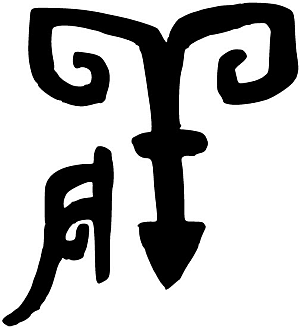Two more hexagrams with mountains on top, two more intriguing trigram pictures…
Hexagram 26, Great Taming
Hexagram 26 is ‘Great Taming’; ‘taming’, chu, originally means simply to rear domestic animals. Great Taming – rearing big animals, like the horse, bullock and boar in the moving line texts. By extension, it comes to mean nurturing, providing for, cultivating, and (with an added ‘grass’ element) accumulate or store up.
Tradition says – wisely – that chu is what the mountain is doing. This is something we can recognise from previous ‘mountain-outside’ hexagrams like 4 or 18: mountain above acts like a lid, containing and also nurturing the inner trigram. When xun, wind, tries to contain and nurture heaven, the result is Small Taming, Hexagram 9; the massive solidity of mountain above makes for Great Taming. The form of the hexagram makes me think of a fully-charged battery:
The Oracle
‘Great taming,
Constancy bears fruit.
Not eating at home, good fortune.
Fruitful to cross the great river.’
Not eating at home, crossing the great river – how come Great Taming, with that outer mountain representing stillness and stopping, has such an adventurous oracle?
Stephen Field has a direct answer to this: he calls the hexagram ‘Greater Stock’ and translates as ‘these are not to be eaten at home.’ Big animals are for sacrifices, not your cooking pot.
A traditional interpretation, familiar from Wilhelm, is that ‘not eating at home’ means to ‘earn one’s bread by entering upon public office.’ Likewise, Wang Bi (in Lynn’s translation) says that this livestock is used to feed worthy people, ‘which frees them from having to eat at home.’
A picture emerges: this is not just for you; this is not for hoarding. Now you are freed from subsistence, you can dedicate your resources to a higher cause. As Bradford Hatcher put it,
‘Not dining at home, and crossing great streams, puts us in a larger world, serving higher powers.’
So in this light, how could we imagine heaven under the mountain? Instead of thinking of heaven’s power stored up, we could try imagining the mountain’s boundary as much further away. All of heaven is on the inside; your world has grown; your possibilities are expanding. ‘The sky’s the limit’?
The Image
The Image authors saw heaven in the mountain as something like a library:
‘Heaven dwells in the centre of the mountain. Great Taming.
A noble one uses the many annals of ancient words and past deeds,
And cultivates his character.’
In Hexagram 22, the mountain lent outer form to inner illumination, creating good day-to-day government. Here, it’s lending form to inner qian: heaven, creative power, and natural law. That makes for a store of enduring wisdom – books, whose boundaries expand in other dimensions, like imagination and time.
(Building storehouses for libraries of records had been Chinese practice since Shang times – and there would also be a famous mediaeval Library Cave.)
The noble one, by the way, is chu-ing his character – nurturing, husbanding, providing for it; this is the hexagram name, used as a verb. By engaging with the ancient texts, he enlarges his own capacity.
We could also imagine that the mountains, because they are ancient and enduring, contain the laws of heaven at their heart, in the secrets of their formation. China has many sacred mountains, climbed to get closer to heaven. There are hints here of mountain mystery. Again, it’s not just that the mountain ‘contains’ greatness, but that heaven infuses mountain, increasing the inner space, making the container great.
Hexagram 27, Nourishment
From heaven to thunder
From 26 to 27 is one of those steps in the Sequence made by changing a single trigram: from heaven under the mountain, to thunder. Absolute truth and natural law have become active energy – which I think is another way of saying that this has become personal, ‘your own quest’ for nourishment. As so often, these trigrams are an ‘energy diagram’: contained active energy, held within the confines of the self.
The Sequence itself remembers that 26 is about rearing big animals, and says simply,
‘Things are tamed, and so there can be nurturing, and so Nourishment follows. Nourishment means nurturing.’
I want to show you the character for ‘nurturing’ or ‘providing for’, yang not because it’s especially revealing, but just because I like it. It shows a hand bringing food to an enormous sheep:

The name of Hexagram 27, yi 頤, originally means ‘jaws’ as well as ‘nourishing’ – though thanks to Spielberg, we can’t very well call it that. You can see the jaws in the trigram picture –
Not only does this look like a tooth-filled maw, but we have a static upper trigram, mountain, and mobile lower trigram, thunder: the upper and lower jaw.
The Oracle
‘Nourishment: constancy brings good fortune.
See the jaws,
Your own quest for something real to fill your mouth.’
See the jaws, it says, encouraging us to notice that this hexagram is a picture. And I think the ‘seeing’ also extends to the next line: see yourself, and how you seek something real to fill your mouth.
Where are thunder and mountain in this? I think ‘your quest’ would be thunder, that sets things in motion. And then the mountain becomes a standpoint from which we can see this. When you cast hexagram 27, you’re encouraged to see yourself in this picture: your drive, your hunger, specifically for something real.
The idea of a mountain for ‘seeing’ begins with Hexagram 20, which is the mountain trigram writ large, with each line doubled –
This makes me think that the name of Hexagram 20 is used here quite deliberately. See!
The Image
‘Below the mountain is thunder. Nourishment.
The noble one reflects on his words in conversation,
And is discriminating about what he eats and drinks.’
As the Oracle implied, the mountain provides a standpoint to see from. It’s a still point for awareness of this constant motion of conversing and consuming: a place to listen to the echoes of our conversation, or a way to set limits to our consumption. (‘Discriminating’ here is the name of Hexagram 60: measuring, subdividing, limiting. It manages to suggest both taste testing – ‘bitter measures do not allow constancy’ – and also portion control!)
So as we come to the end of the 20s, and of the Upper Canon, mountain has contained and nurtured, mentored and governed, and now starts to provide a place for self-awareness.













amazing insights full